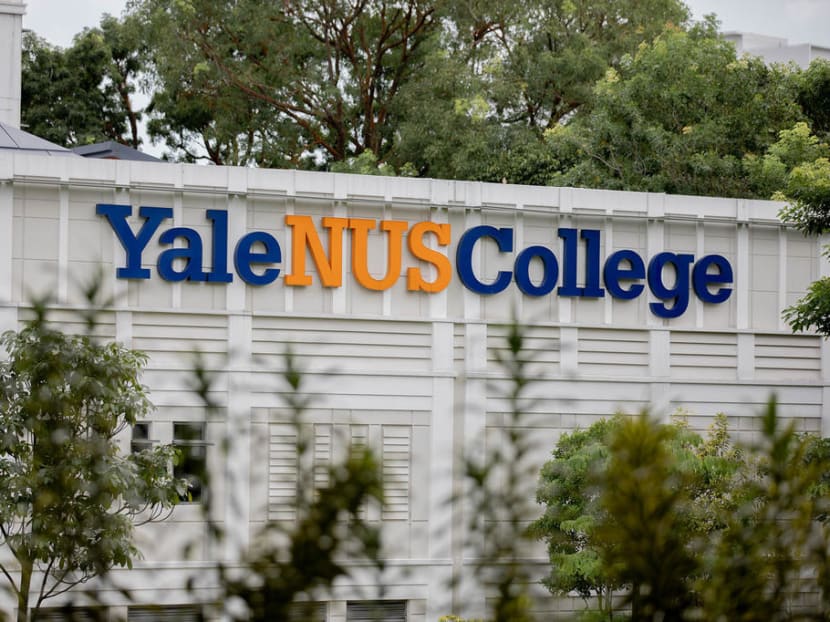Talks on fate of Yale-NUS involved only universities’ senior leadership, boards due to sensitive nature: Chan Chun Sing
SINGAPORE — The National University of Singapore (NUS) did not consult the student body and staff members of Yale-NUS College on its recent decision to merge the college with the University Scholars Programme (USP) under NUS because the move involved discussions on “sensitive issues of strategy and finances”, Education Minister Chan Chun Sing said on Monday (Sept 13).

Education Minister Chan Chun Sing said he was confident that a Yale-NUS College degree would continue to be highly valued even after 2025.
- NUS did not consult Yale-NUS College’s student body and staff members on merging the college with a scholars programme
- This because the decision involved discussions on “sensitive issues of strategy and finances”, Education Minister Chan Chun Sing said
- These talks were between the senior leadership and boards of NUS and Yale University, he added
- Mr Chan said that beyond 2025, NUS would continue giving supporting documentation on this merger and what its degree conveys
SINGAPORE — The National University of Singapore (NUS) did not consult the student body and staff members of Yale-NUS College on its recent decision to merge the college with the University Scholars Programme (USP) under NUS because the move involved discussions on “sensitive issues of strategy and finances”, Education Minister Chan Chun Sing said on Monday (Sept 13).
These talks were between the senior leadership and boards of NUS and Yale University in the United States.
Responding to eight Members of Parliament (MPs) who filed questions on the planned merger, Mr Chan told the House that in July, when NUS initiated discussions with Yale University, the issue of timing was also discussed and determined jointly.
“While the partnership would only end in 2025, both parties felt that the responsible thing to do was to announce it early, rather than hold back.
“It would have been bad faith to delay the announcement and continue to admit students who would not be able to complete their education in Yale-NUS College, or to continue to hire faculty, beyond this juncture,” Mr Chan said.
In late August, NUS announced that this year’s cohort of students enrolled in Yale-NUS College would be its last.
The college will stay open and continue running its academic, co-curricular and research programmes until the end of academic year 2024/2025.
The abrupt announcement sparked an outcry from student leaders at Yale-NUS College, who urged the NUS administration to provide greater transparency and accountability on the decision to merge the college with USP.
Mr Chan said that when NUS started discussions with Yale University, the American varsity acknowledged NUS’ vision to bring together Yale-NUS College and USP into a new college that would not bear Yale’s name.
The leadership of Yale-NUS College was informed that same month and the NUS board of trustees approved the decision in early August, with Yale-NUS College’s governing board endorsing the transition plans in late August.
Mr Chan said that the announcement was planned for August after Yale-NUS College’s governing board considered and endorsed the broad transition approach.
This allowed faculty and staff members “maximum time”, between now and 2025, to work through the details of the transition.
“This also means that Yale-NUS College’s 2021 intake would be its final cohort. This Class of 2025 cohort would have the full four years to complete their undergraduate studies at Yale-NUS College,” he said.
Responding to concerns over the move‘s possible impact on the stature of a Yale-NUS College degree, Mr Chan said that NUS and Yale, as globally renowned universities, were well-recognised by employers, including the public sector and postgraduate institutions.
“I am confident that the Yale-NUS College degree will continue to be highly valued, and its past and future graduating students remain in very good standing, even after 2025.”
He assured students that beyond 2025, NUS would continue providing supporting documentation to explain the context of Yale-NUS College and what a degree from the college conveys.
NUS will also provide letters of recommendation or referees, if alumni need them.
He also gave the assurance that students of Yale-NUS College would continue to have access to the full range of majors and minors offered until 2025.
Separately, no faculty or staff member would be made redundant as a result of the merger and NUS has committed to honouring all existing employment contracts.
“I know some students and parents may, nonetheless, have lingering concerns, and we respect the preferences of those who may wish to consider other options,” Mr Chan said.
“NUS and Yale-NUS College will engage them and provide assistance where they can.”
ACADEMIC FREEDOM
Mr Chan emphasised again that the new college would maintain the spirit of independent inquiry and inclusivity that characterise Yale-NUS College and USP.
On the future of liberal arts education, Mr Chan noted that NUS was building on the foundations that Yale-NUS College and USP have laid as well as the lessons gleaned from the tie-up with Yale.
“It wants to make the distinctive features of education in Yale-NUS College and USP more inclusive and more accessible,” he said.
There have also been questions about the impact of the merger on academic freedom in Singapore.
In response, Mr Chan said that there had been similar concerns about a perceived lack of academic freedom when Yale-NUS College was established in 2011, but they proved unfounded.
“Few believed then that Yale-NUS College would live up to its ambition. Even fewer would own it. It is perhaps ironic and a testimony to NUS and Yale-NUS College’s efforts all these years that Yale-NUS College is now seen as a paragon of academic freedom in Singapore.”
Yale-NUS College’s policies on academic freedom, Mr Chan added, took reference from NUS’ practices relating to academic freedom, and these practices have remained unchanged since.
He noted that the faculties of arts and social sciences at NUS and other autonomous universities here have had a long history of teaching and research, including on potentially sensitive and difficult topics, long before Yale-NUS College was set up.
“They are highly ranked globally and attract distinguished scholars.
“It would be grossly unfair to faculty members in NUS and other autonomous universities to suggest that their teaching or research is in any way less rigorous, or of lower quality or less free than that of Yale-NUS College faculty.”











